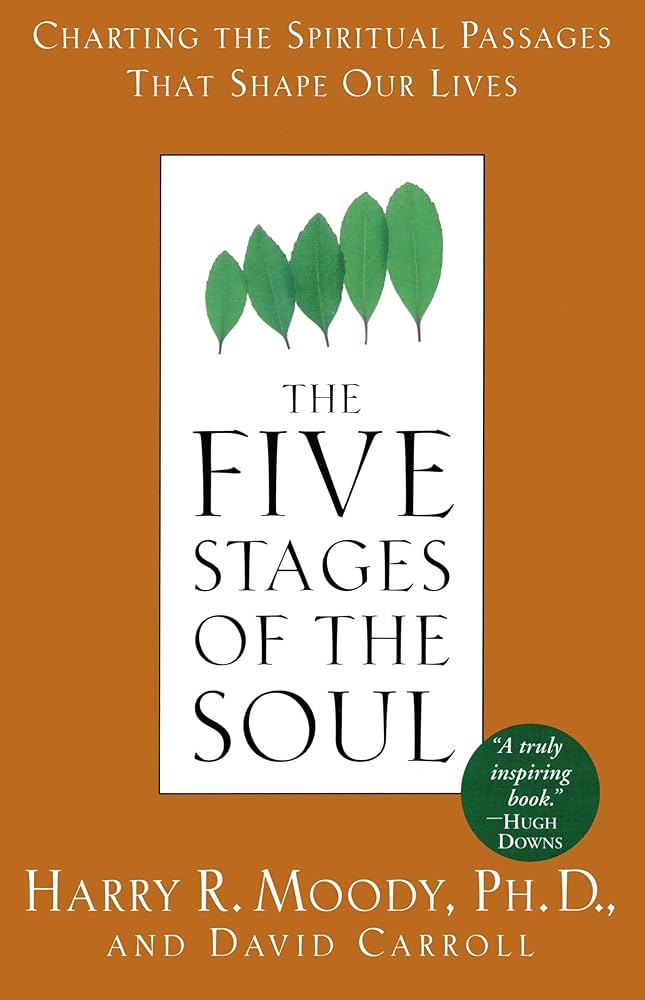Based on twenty years of research, The Five Stages of the Soul is the first book to focus squarely on the spiritual passages that the majority of us go through, offering readers a detailed road map of their quest for meaning and self-discovery.
I was given this book in my early twenties, when I knew everything. So I didn't like it very much. About ten years later, when I felt much less confident about the world and my place in it, I returned to the book. In it I found someone who accurately described my journey so far and my need for pace and purpose. I'm fairly sure this isn't the best book on the subject, but it switched on a light for me and has given me comfort to know that, when the river is rough, other people have been there before and steered the course, so it can't be impossible.
Synopsis
This is a Google Gemini synopsis of Five Stages of the Soul by David Cole from 2020.
Here are seven key points from Five Stages of the Soul:
- The book introduces the concept of five distinct stages the soul progresses through, starting from initial awareness.
- Each stage is characterised by unique challenges and opportunities for growth and understanding.
- Cole emphasises that these stages are not linear in a strict sense; individuals may revisit or experience them differently.
- The journey through these stages involves shedding old beliefs and embracing new perspectives.
- Self-reflection and conscious engagement are crucial for moving from one stage to the next.
- *The ultimate aim of the journey is to achieve a deeper connection with one’s true self and the universal consciousness.
- The book suggests that the full depth of wisdom in ancient religious texts, such as the Quran, Bible, and Torah, often becomes accessible only after significant life experience, perhaps around the age of 30.
David Cole’s Five Stages of the Soul presents a framework for understanding the spiritual evolution of an individual. It proposes that the soul embarks on a developmental journey, progressing through five distinct phases, each offering specific lessons and insights.
This progression is not necessarily a straightforward, linear path; rather, it is presented as a dynamic process where individuals may move back and forth, or experience different stages concurrently, depending on their personal growth and life experiences.
A notable aspect of Cole’s work is his perspective on the interpretation of sacred texts. He posits that many profound spiritual writings, including the Quran, the Bible, and the Torah, contain layers of meaning that can only be fully comprehended with the accumulation of life experience. Cole suggests that certain profound lessons within these texts resonate more deeply, or even become truly discernible, for individuals who have reached a certain level of maturity, perhaps around the age of 30. This idea highlights that spiritual wisdom often requires a lived context for its complete assimilation, moving beyond mere intellectual understanding.
The core of Cole’s argument is that each stage demands a unique form of self-awareness and engagement. From the initial awakening to a broader consciousness to the more advanced stages of spiritual integration, the book guides the reader through the challenges and transformations inherent in this process. It encourages introspection and conscious participation in one’s spiritual development, suggesting that active engagement is key to navigating these phases successfully, ultimately leading to a profound connection with one’s authentic self and a deeper understanding of universal interconnectedness. Cole offers practical guidance and reflections, making the abstract concepts of spiritual growth accessible to a wider audience, inviting readers to explore their inner landscape and embark on a purposeful journey of the soul.
Key Points
- Soul progresses through stages
- Challenges define each stage
- Not strictly linear progression
- Shed old, gain new
- Self reflection is key
- Connect with true self
- Ancient texts mature with age.

